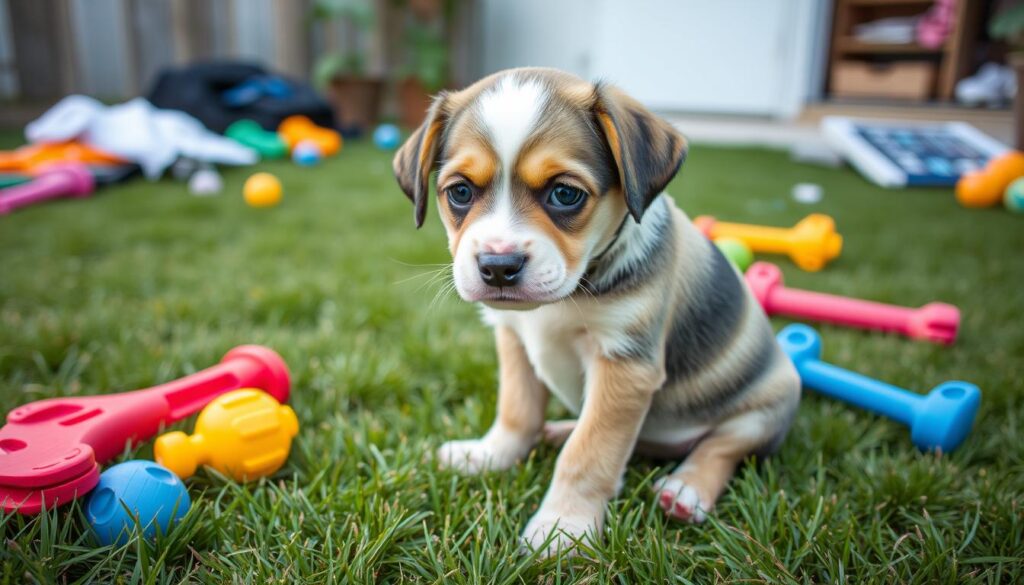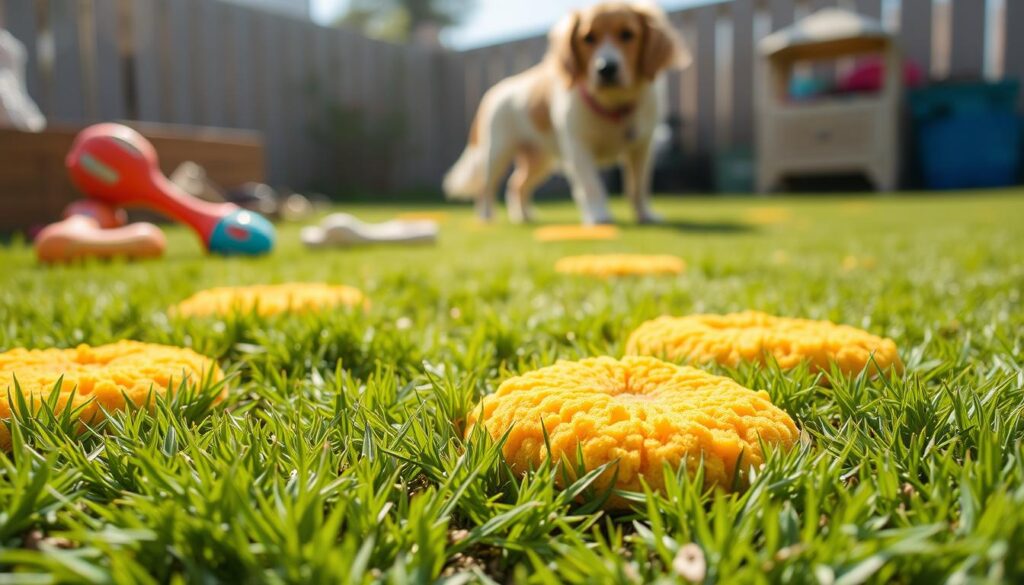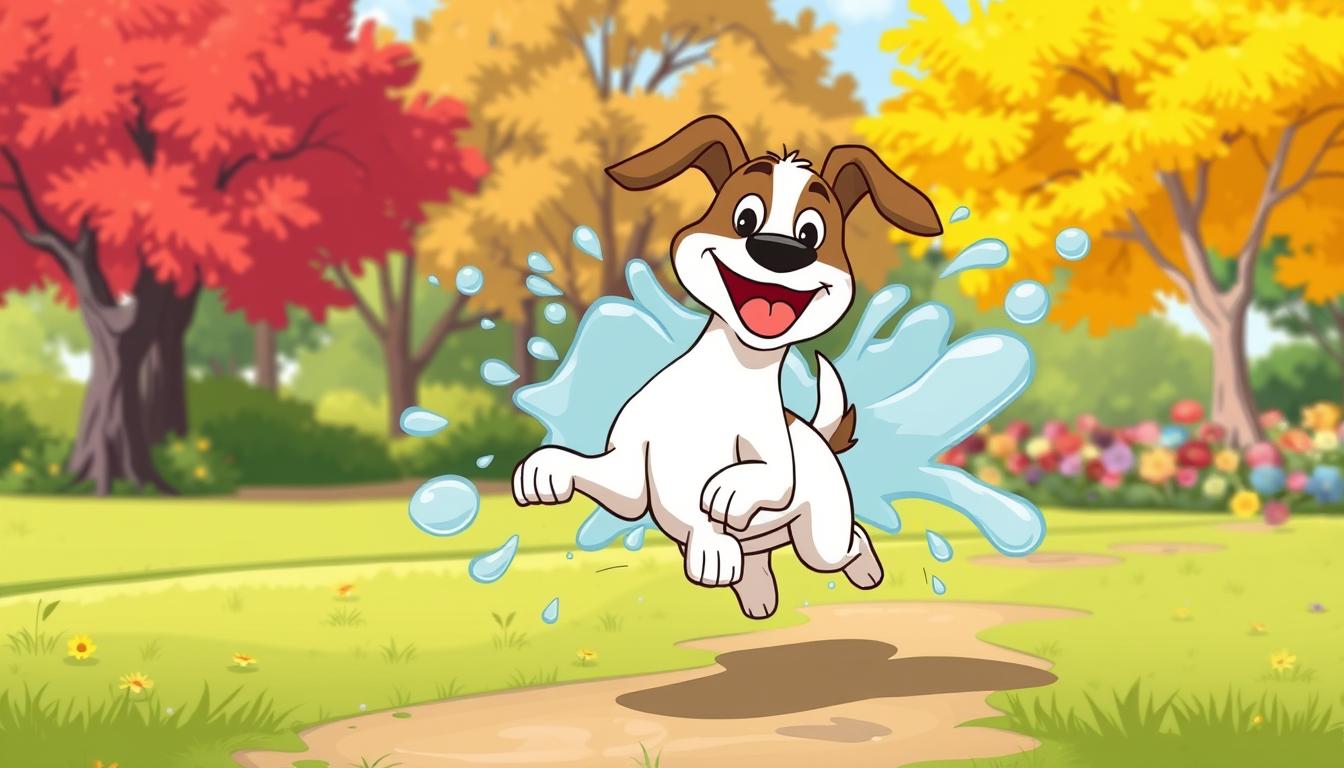As a devoted pet owner, you might find yourself wondering when your dog has diarrhea but seems fine. This situation is common and can make you worry about your dog’s health. But, not all cases of dog diarrhea mean you need to rush to the vet.
In this article, we’ll look at dog diarrhea in detail. We’ll talk about how to tell if it’s normal or not, what might cause it, and when you should see a vet. Knowing more about your dog’s digestive health helps you take better care of them.
Key Takeaways
- Diarrhea in dogs can occur even when they are acting normally, which may not always require immediate veterinary attention.
- Understanding the difference between normal and abnormal diarrhea symptoms is crucial for assessing your dog’s condition.
- Common causes of mild dog diarrhea include dietary indiscretion, stress, and minor infections, which may resolve with home treatment.
- Monitoring your dog’s recovery and seeking veterinary care if the diarrhea persists or worsens is essential for their well-being.
- Implementing preventative measures, such as proper diet management and environmental adjustments, can help reduce the risk of future diarrhea episodes.
Understanding Normal vs. Abnormal Dog Diarrhea Symptoms
It’s key to know the difference between normal and abnormal dog diarrhea. Knowing when your dog’s bowel movements are a worry can help you care for them better. It also ensures they get the right treatment if needed.
Common Characteristics of Normal Diarrhea
Mild, occasional diarrhea in dogs is usually not a big deal. Normal diarrhea signs include:
- Soft, loose stools that are still formed
- Diarrhea that lasts for a day or two
- No other symptoms like vomiting or feeling tired
Red Flags That Require Immediate Attention
While some diarrhea is normal, other signs mean a serious problem. Look out for:
- Watery, explosive diarrhea
- Diarrhea lasting more than 24-48 hours
- Bloody or mucus-filled stools
- Severe dehydration
- Decreased appetite or vomiting
- Abdominal pain or distress
Color Changes and Their Meanings
The color of your dog’s yellow bowel movements or yellow stool can hint at their health. While some color changes are normal, steady changes might mean a health issue. For example:
| Stool Color | Potential Meaning |
|---|---|
| Yellow or greasy | Malabsorption or pancreatic issues |
| White or grey | Liver or bile duct problems |
| Red or bloody | Gastrointestinal bleeding |
By knowing the difference between normal and abnormal dog diarrhea, you can spot when your dog needs a vet.
My Dog Has Diarrhea But Is Acting Fine: Should You Worry?
If your puppy has diarrhea but is still playful and energetic, or if your adult dog has bloody diarrhea but seems fine, you might wonder if you should worry. The good news is that not all cases of canine diarrhea need immediate vet attention. This is true if your dog’s overall demeanor and behavior stay the same.
But, it’s crucial to watch your dog closely and know the signs of a serious issue. A puppy with diarrhea but still playful might just have a minor upset stomach. Yet, a dog with bloody diarrhea should see a vet, even if they seem healthy.
Monitoring Your Dog’s Behavior
The key to knowing if your dog’s diarrhea is serious is their behavior and how they act. If your dog has diarrhea but is still playful, eating, and acting normal, it’s probably not a big deal. But, if your dog has bloody diarrhea but is acting normal, you should get them checked by a vet right away.
Watch your dog’s energy, appetite, and any changes in their behavior or routine. If they seem tired, won’t eat, or show other concerning signs, get them to the vet, even if the diarrhea doesn’t seem bad.

Remember, every dog is different, and how bad their diarrhea is doesn’t always show how they’re feeling. Trust your instincts and call your vet if you’re worried about your dog’s health and well-being.
Common Causes of Mild Dog Diarrhea
Seeing your dog’s loose stool can be worrying. But, many common reasons can cause mild diarrhea in dogs. These include eating things they shouldn’t, stress, and changes in their environment. Sometimes, infections can also upset their stomach, leading to yellow poop.
Dietary Indiscretion and Food Sensitivities
Dogs often get diarrhea from eating things they shouldn’t. This includes table scraps, spoiled food, or new treats. It can upset their stomach, causing yellow-tinged stools. Food allergies or sensitivities can also cause similar problems.
Stress and Environmental Changes
Stress and big changes can upset a dog’s stomach. Moving to a new home, getting a new family member, or changes in routine can cause anxiety. This can show up as yellow poop or other diarrhea symptoms.
Bacterial and Viral Infections
At times, mild diarrhea can be due to infections. Conditions like Giardia or Coccidia can cause stomach upset, including yellow poop. Even though these infections are usually mild, it’s wise to check with your vet to make sure there’s no serious issue.
Knowing why your dog has mild diarrhea is the first step to fixing it. By finding and fixing the cause, you can help your dog feel better quickly.
When Yellow Stool in Dogs Becomes a Concern
While an occasional yellow bowel movement in dogs might not be a big deal, persistent yellow stools can signal a health issue. Yellow stool in dogs can stem from many causes, like diet changes or serious liver or gallbladder problems.
Diet changes are a common reason for yellow bowel movements in dogs. Foods high in fat or ingredients dogs are sensitive to can cause yellow, greasy stools. This usually gets better once their digestive system adjusts.
But, if yellow stool keeps coming back or is paired with other symptoms, it could mean a serious problem. Issues like liver or gallbladder problems, pancreatitis, or even cancer can cause yellow, foul-smelling stools. In these cases, seeing a vet is crucial for a diagnosis and treatment.
If your dog’s yellow stool comes with symptoms like vomiting, loss of appetite, or tiredness, get vet help fast. Quick action can help find and fix the problem, keeping your dog healthy.

Remember, when it comes to your dog’s health, it’s always better to err on the side of caution. If you notice any persistent changes in your dog’s bowel movements or overall well-being, don’t hesitate to consult your veterinarian for guidance.
Home Remedies and Treatment Options
If your dog has mild diarrhea but seems okay, you can try some home remedies. These can help manage the issue and make your dog feel better.
Safe Dietary Modifications
Changing your dog’s diet is a good first step for dog diarrhea. Try feeding boiled chicken and rice or a special dog food for sensitive stomachs. Once the diarrhea stops, you can go back to their regular food.
Recommended Over-the-Counter Solutions
- Probiotics: These supplements can help balance your dog’s gut and ease home remedies for dog diarrhea.
- Antidiarrhoeal medications: Products like Imodium can help reduce diarrhea. But, always talk to your vet before giving any medicine.
Hydration Management Tips
Keeping your dog hydrated is key when they have diarrhea. Make sure they always have fresh, clean water. You can also give them diluted Pedialyte to replace lost fluids and minerals.
While home remedies work for mild cases, watch your dog closely. If the diarrhea doesn’t get better or if they show other bad signs, see a vet.
Signs That Indicate a Veterinary Emergency
When your dog has diarrhea but seems okay, watch them closely. Mild cases might be handled at home. But, some signs need vet help right away, even if your dog looks fine.
Persistent vomiting is a big warning sign. It can cause dehydration and other serious problems. If your dog keeps vomiting, get help fast.
Bloody diarrhea is another concern. A little blood is okay, but a lot or more blood means trouble. It could mean your dog needs medical help, even if they seem healthy.
Look out for dehydration signs like tiredness, sunken eyes, and dry gums. Diarrhea can quickly take away a dog’s fluids and salts. This is very dangerous.
If your dog shows these bad signs, call your vet right away. Quick action is key when dog diarrhea becomes an emergency.
Prevention Strategies for Future Episodes
To stop your dog’s diarrhea, tackle the causes early. Simple steps can help keep your dog’s digestive system healthy. This way, you can avoid future diarrhea and keep your dog feeling great.
Diet Management Guidelines
Watching what your dog eats is key to avoiding diarrhea. Don’t change their food suddenly. Instead, introduce new foods slowly to help their stomach adjust. Choose high-quality, easy-to-digest dog foods. If your dog has food allergies, talk to your vet.
Lifestyle Adjustments
- Reduce stress: Minimize environmental changes, loud noises, and other potential stressors that can disrupt your dog’s digestive system.
- Maintain a consistent routine: Stick to a regular feeding and exercise schedule to support your dog’s overall health and prevent gastrointestinal issues.
- Promote hydration: Ensure your dog has access to clean, fresh water at all times to help maintain proper fluid balance and prevent dehydration.
By following these tips, you can help prevent dog diarrhea and keep your dog healthy. Remember, fixing the cause of diarrhea is essential for a happy, healthy pet.
Monitoring Your Dog’s Recovery Process
As your dog’s diarrhea gets better, watch them closely. Start adding their usual food back slowly. Keep an eye on their stool to see if it gets firmer and regular again.
Talk to your vet often about how your dog is doing. They can help you know when it’s safe to go back to their normal diet. If your dog’s health doesn’t get better, it might mean they need more help from the vet.
Remember, dog recovery takes time. Be patient with your dog as they get back to normal. By keeping up with diarrhea follow-up care, you’ll help them recover smoothly and avoid future diarrhea problems.

